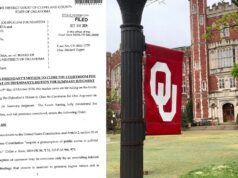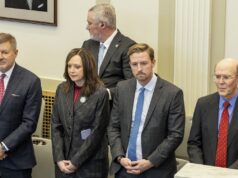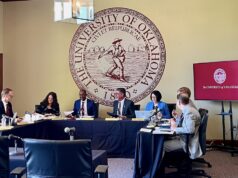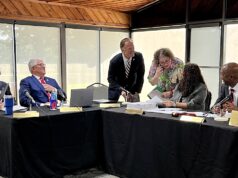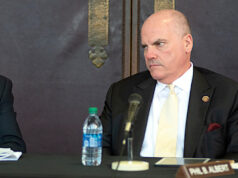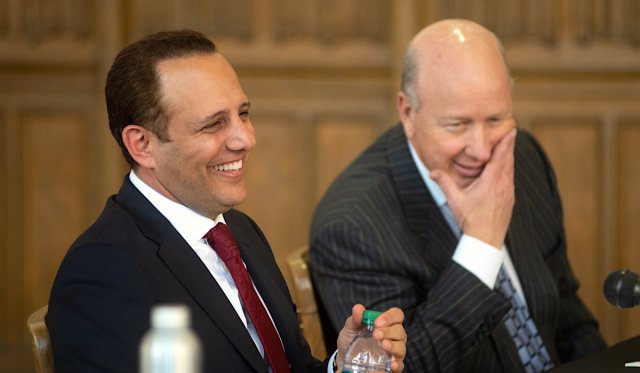

When the University of Oklahoma Board of Regents named longtime administrator Joe Harroz interim president after a six-hour executive session, they specified a term of “at least 15 months.” Almost exactly one year later, the board named Harroz permanent president today without a new search process for the position, citing the longtime OU leader’s “steady hand” over a 12-month interim period that has featured the COVID-19 pandemic, among other challenges.
Harroz might recognize those challenges — or at least how they have upended and jeopardized a university known for recruiting students with a beautiful campus and physical resources — better than anyone. As regents erase “interim” from his presidential desk plate, Harroz remains tasked with assessing how OU’s spring semester ended with online-only education while planning for an uncertain future.
“My job is not to carry a title. It is to understand what our purpose is and to serve — to serve as something that is so remarkable in our society,” Harroz said to the board. “This is not just an enterprise. We serve the next generation of students and transmit knowledge. We create knowledge. What happens here is not ordinary, and what happens here matters. I will always be humble, and I understand exactly what my limitations are.”
Amid the pandemic, the university is facing myriad limitations.
“There is so much that is different right now. We know it is temporary. We just don’t know how long temporary is,” Harroz said during Friday’s portion of the two-day regents meeting. “The reality is how much we still don’t know. (…) How do we size and address the problem for the coming fiscal year? And sizing this problem is difficult because there are so many variables attached to it.”
Right now, OU has lost about $14.7 million in revenue for Fiscal Year 2020, which ends June 30. That’s the bad news. The good news is that OU is receiving about $17.9 million in federal CARES Act funding, about $9 million of which must be dedicated for emergency financial aid grants to students. Even better news is that, at their Jan. 30 meeting, regents heard from Harroz and Chief Financial Officer Ken Rowe that $14 million in savings had already been identified for FY 2020, including the undoing of an electricity management agreement with the company Corix. (About a decade ago, OU received an up-front payment of about $70 million in exchange for ultimately leasing back the two Norman campus generation facilities.)
“OU’s financial situation is absolutely strong enough not only to endure this situation but to make forward strides,” regent Natalie Shirley said early Saturday morning during a brief regents committee report.
Regents spent six hours in executive session Saturday, returning around 3 p.m. to announce their presidential decision.
National search? ‘We considered that’
In seconding the nomination of President Joe Harroz Jr. and remove the “interim” in his title, Board Chairman Gary Pierson revealed details about the May 2019 meeting that put Harroz in the president’s office to begin with.
“The regents asked Joe to come into a late-night, early-morning meeting that none of us will never forget and told him that he had sufficient support to be named the 15th president of the University of Oklahoma,” Pierson said. “In an unvarnished display of personal character, Joe said he still wants to lead the university, but he was not willing to do so at that time. To his own detriment — because he had the job if he wanted it — he told the regents he thought it would be better for the university and all of its constituency that it would be better if he was named interim president than permanent president.”
Pierson also addressed the board’s quandary of whether to conduct a second official presidential search in a little over two years.
“Let’s just get it right on the table. We know there are going to be some people who say we didn’t do this right because we didn’t do a national search. Well, we considered that, and we considered it very carefully,” Pierson said. “In so doing, we educated ourselves on the national success of national searches, especially in terms of, ‘What is the longevity of somebody coming from out of state to a new institution and their tenure before they leave for the next institution?'”
Pierson said national searches typically offer students, faculty and regents only a short period of time to make decisions about candidates.
“At the end of the day, any one individual might have spent two to three hours with a person they perhaps didn’t know beforehand. And if you hire that person — which is not improper — but if you hire that person, you then have to believe in the notion of hope,” Pierson said. “We did not believe, as the Board of Regents, that at this point in time of the history of the University of Oklahoma — with Joe sitting right in front of us — that hope is the strategy that will take us into the future and a future of excellence.”
Former Gov. Frank Keating, who serves as vice chairman of the board, praised Harroz for possessing key leadership qualities.
“I said the first credential is goodness. You should be a person of high moral character,” Keating said. “Joe Harroz is a humble person. He has an extraordinary background.”
Shirley said leaders are “chosen for a moment in time.”
“In the last year, we have been through many moments throughout the OU system,” Shirley said. “And over and over again, Joe Harroz has risen to the challenge and not just satisfied that moment in time but has moved the university and the whole system forward.”
Regent Phil Albert said Harroz has “demonstrated leadership” and is “the right guy at the right time.” Regent Michael Cawley echoed that sentiment.
“It’s enormously proud time for me to be a part of this board that is going to make this selection,” Cawley said. “I think Joe realizes that the success for the University of Oklahoma means success for all of the constituent parts.”
Regent Eric Stevenson emphasized his appreciation for Harroz’s financial stewardship of the university.
“The students respect, admire and like Joe. That goes a long, long way in my book,” Stevenson said.
The newest regent, Anita Holloway, echoed her peers.
“Joe, you have my full and unwavering support, and we will be there with you every step of the way,” she said.
Of fathers and sons
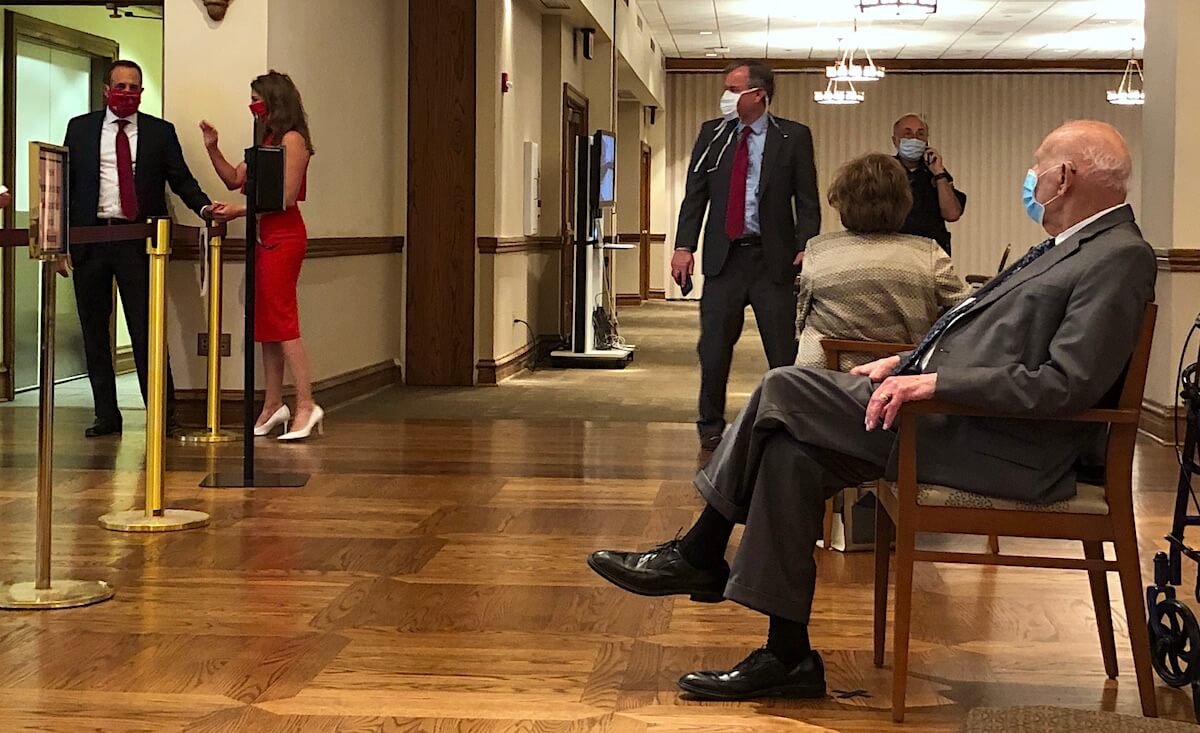
Harroz thanked the Board of Regents for their support, and he referenced the “sacred mission” he often discusses about the university. In doing so, he referenced his mother and his 90-year-old father, Dr. Joseph Harroz Sr.
“My dad proves why a great, public, accessible, flagship university matters. My father’s dad came over — his parents sent him on a boat from Lebanon — to find a better life,” Harroz Jr. said. “He came to Oklahoma because of the oil fields. My grandfather never learned to read or write. He had nine children, none of whom had passed high school except for my father. And my dad, because of the University of Oklahoma, was able to go to college and on to medical school — both at OU.”
Harroz said that education allowed his father to change lives and provide a life for their family.
“That story is my story. But that story is all of our story. That story is the University of Oklahoma. That is the story of yesterday, that is the story of today, and that is the story of tomorrow,” Harroz said. “To be a truly great university, those are the stories we need to continue to allow to occur over time.”
Background on Joe Harroz, recent OU turmoil
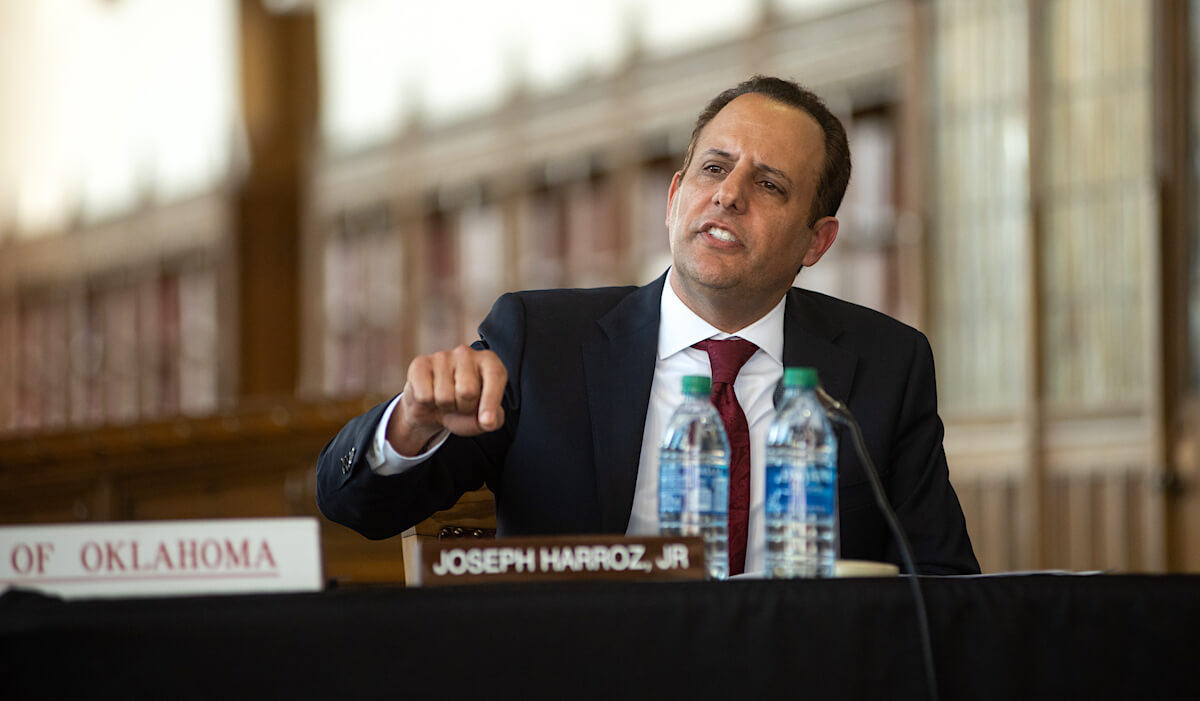
An Oklahoma native, Harroz graduated with an economics degree from OU in 1989 and earned his juris doctorate from Georgetown University in 1992. That same year, he became David Boren’s U.S. Senate legislative director at age 25. He served as Boren’s legal counsel before joining the Oklahoma City law firm Crowe and Dunlevy in 1993. The next year, the two men reunited when Boren was named OU’s 13th president. Harroz worked as OU’s vice president of executive affairs and then legal counsel, moved to the private sector in 2008 and returned in 2010 as dean of the OU College of Law.
Harroz was one of three finalists to succeed Boren in 2018, but regents selected retired oil executive Jim Gallogly as the university’s 14th president after a search assisted by a 17-member committee. Gallogly, however, said publicly that he had not sought the job.
A major donor to OU, Gallogly terminated numerous administrators and launched initiatives to investigate, audit and reform the university’s finances. Results of those audits changed OU’s ranking with U.S. News and World Report, and they spurred the criminal investigations of Boren and longtime confidant Tripp Hall, whom Gallogly terminated as vice president for university development in November 2018.
But Gallogly’s tenure featured its own controversy, with Boren supporters criticizing the new president, whose unfamiliarity with university governance and the political realm left him with few allies. Students and alumni also criticized his response to on-campus racial incidents.
On Mother’s Day in May 2019, Gallogly announced his resignation less than one year after taking over as president. Days prior, the OU Board of Regents had met in extended executive sessions to discuss Gallogly’s employment.
The next week, regents convened an 8 p.m. meeting and held another executive session until 2 a.m. They concluded their meeting and announced Harroz as interim president. After the board’s next meeting in June 2019, Harroz discussed his years working for Boren and the criminal investigation into the longtime Oklahoma leader, which is ongoing in 2020. Harroz declined to say whether he had been interviewed by the Oklahoma State Bureau of Investigation, but he said he did speak with the Jones Day law firm hired to examine allegations of financial and sexual misconduct by Boren.
“That was a comprehensive investigation,” Harroz said in June 2019. “I think they — from what I understand — reached out to everyone that was here during the relevant time periods. I was here during the relevant time periods, and I don’t want to get into details about that.”
Harroz said he had pledged to regents that he would stay out of the Boren investigation, and he spent the majority of his 12 months as interim president pushing for efficiencies and financial savings, which helped allow regents to keep tuition flat for a second straight year.
“If an education is inaccessible, if it’s only available based on your economic circumstance, then I don’t know how you can be a great university,” Harroz said in June 2019. “Our goal is not just to have a sound budget, our goal is to drive that mission we have that is sacred.”









